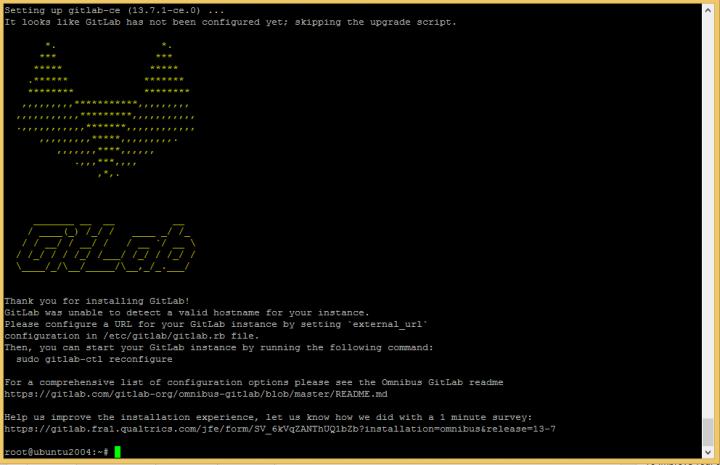
- HOW TO INSTALL GITLAB ON UBUNTU HOW TO
- HOW TO INSTALL GITLAB ON UBUNTU INSTALL
- HOW TO INSTALL GITLAB ON UBUNTU UPDATE
- HOW TO INSTALL GITLAB ON UBUNTU SOFTWARE
- HOW TO INSTALL GITLAB ON UBUNTU CODE
HOW TO INSTALL GITLAB ON UBUNTU INSTALL
In order for GitLab to be able to send notification emails, you can either install and use Postfix or use some transactional mail service such as SendGrid, MailChimp, MailGun or SES in which case you can skip the following step and configure
HOW TO INSTALL GITLAB ON UBUNTU UPDATE
Refresh the local package index and install the dependencies with the following commands: sudo apt update sudo apt install curl openssh-server ca-certificates
HOW TO INSTALL GITLAB ON UBUNTU HOW TO
You can follow the steps in our How To Set Up a Firewall with UFW on Ubuntu 18.04īefore starting with the tutorial, make sure you are logged in as a user with sudo privileges

According to the GitLab requirements page This tutorial assumes that you have a fresh Ubuntu 18.04 installation. This tutorial covers the steps necessary for installing and configuring GitLab (CE) on an Ubuntu 18.04 system using the Omnibus packages. There are several ways to install GitLab depending on the required use case. The GitLab interface is well-designed, clean, intuitive and close to GitHub’s in terms of user experience and functionality. It can import projects and issues from different sources including GitHub, which makes the migration process hassle-free. Is the number one choice if you want to move away from GitHub There are three different editions of GitLab available, Community Edition (CE), Enterprise Edition (EE), and a GitLab-hosted version. It enables developers to create, review, and deploy their projects.
HOW TO INSTALL GITLAB ON UBUNTU CODE
I hope this article will help you to install GitLab on your local devices or server.Including wiki, issue management, code review, monitoring, and continuous integration and deployment. In this article, we learn how to integrate the GitLab CE into our local Ubuntu system. Then, you will see the dashboard like below. Now, you can access the GitLab dashboard using the root user and password (recently changed). Once the password is changed you will be redirected to the login page which looks like this. In the initial phase, you will be requested to change the password of the root user. In my case, it’s my system ip then you will see the following result output in the browser. Now, after everything has been setup you can access GitLab in your local device or server through configure domain name. Then, to stop the service run, $ sudo gitlab-ctl stop Browsing GitLab Web Interface You can execute the following command to start the service, $ sudo gitlab-ctl start $ sudo gitlab-ctl reconfigureĪfter reconfiguration finished, you can check the status by running: $ sudo gitlab-ctl status It might take a while to complete the re-configuration. Now, once configured execute the following command to apply the configuration changes. If you want to use a local domain name, you can configure at /etc/hosts. In my case, I will go with my device IP for the demonstration. $ sudo apt update $ sudo apt install gitlab-ce -yĪfter installation is complete, we need to replace the existing example subdomain with a valid domain or sub-domain in the external_url section. To install the GitLab CE package execute the following command.

You have just added a gitlab repository so once again update your system. Now, you can see the GitLab package repository content in the following path: $ cat /etc/apt//gitlab_gitlab-ce.list In the above curl command, the -s option refers to silent (i.e no progress bar), and the -S option refers to show an error. Once all the dependencies installed you need to run the following curl command to download the bash script which adds package info to your system which helps the apt to manage GitLab deb packages for you. Then install the following necessary packages $ sudo apt install -y ca-certificates curl openssh-server Append GitLab Package Repository in the System Installing Prerequisite Dependenciesīefore installing the packages make sure you update the package information. In this article, we will be installing and hosting the community edition of GitLab in Ubuntu 20.04. GitLab has two versions: an enterprise edition that provides paid features and a community edition that is open source and free. It is a web-based hosting tool that helps in the remote distribution of source code among the team.
HOW TO INSTALL GITLAB ON UBUNTU SOFTWARE
GitLab is a complete DevOps platform tool that provides features like managed git repositories, integrated CI/CD pipelines for the applications, Kubernetes integration, and many more which helps in software development.


 0 kommentar(er)
0 kommentar(er)
